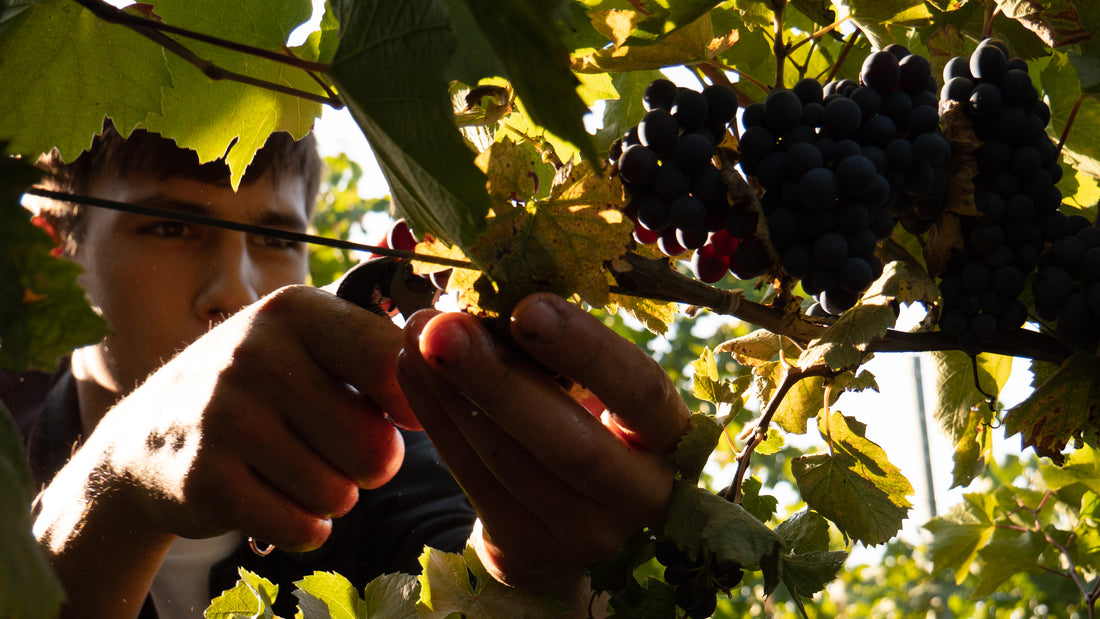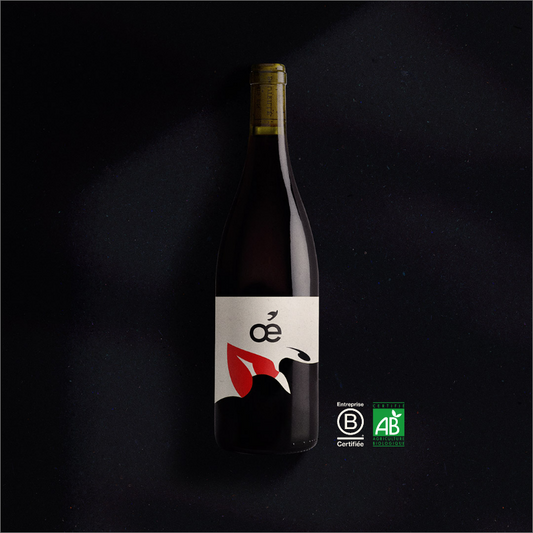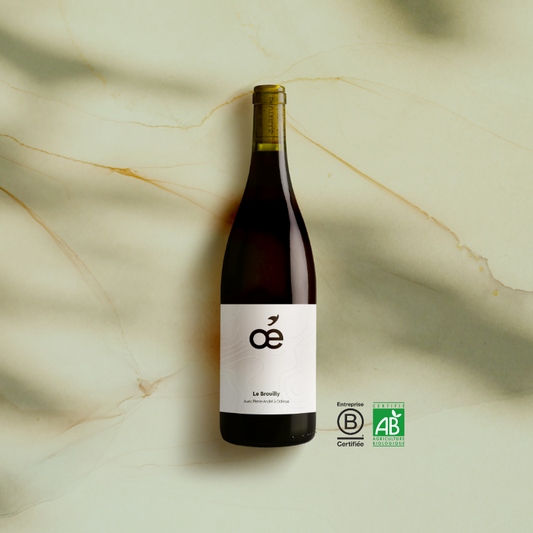A natural wine? Because a wine may not be? It's intriguing, we agree, and yet this name is very real and has its raison d'être! Let's see together what hides behind a natural wine. Let's go !
What is a natural wine?
Nature, you know it, it does not do things by halves, so to honor it, the winemaker does the same and the process of producing a natural wine is a skill from start to finish.
The viticulture of a natural wine
For a fruit to be good and of quality, it must grow in the right conditions. Can you imagine a grape fed with chemical pesticides and various phytosanitary products? We don't. Fortunately, the winegrowers who produce natural wine are of this opinion, and so are the Oé winegrowers.

To cherish the vine and maintain it with respect for nature , the winegrowers pamper it with natural products such as herbal preparations or biodynamic horn dung . In organic and sustainable agriculture , the winegrower pays attention to the doses he uses to protect the vines and fertilize the soil, because it is well known that any excess is bad. Where, in conventional viticulture, the authorized doses are very high and the quantity of authorized products is much greater, in organic and reasoned viticulture , great care is taken to preserve the terroir .
To discover our good organic wines, from organic and sustainable agriculture, click here
The winegrowers who produce natural wine have a philosophy very close to nature. Taking care of your soil carefully and in a sustainable way then takes on its full meaning. The winegrowers practice organic viticulture because they know that it is the most responsible and healthiest way to take care of their vineyards . They work for nature and with nature.
The harmony that reigns in a domain in organic viticulture is beautiful to see, everyone has their place and the balance is maintained as long as everyone respects their neighbour. We've written a few articles about it if you're interested:
The harvest of a natural wine
Harvesting is a must in the world of wine. Moreover, every year, we participate with our winegrowers and we wouldn't miss this moment for anything in the world!
The industrial revolution of the last century gave birth to many mechanical solutions, vehicles with multiple uses, including harvesting machines. Very practical for large vineyards , they do not however have the sensitivity of human hands. To make good natural wine, the grapes must be harvested delicately, and it is with a lot of love and elbow grease that the estates are harvested by hand .

Land of exchange and sharing, wineries bring us together around the same passion: wine. During the manual harvest, everyone is excited because the long-term work of the vines and winegrowers throughout the season finally comes to life. The simple gesture of the arm to harvest the bunches of grapes sounds like an accomplishment and puts a smile on your face!
The vinification of a natural wine
By reading us a lot, you start to know everything about wine, right down to its bottling . So you know that vinification is a series of stages that are both very demanding and very interesting for the winegrower because he then expresses all his talent. To produce a white wine , a rosé wine , a red wine , a sparkling wine, a dry wine, a sweet wine, there are so many options that we cannot mention them all and each one has its particularity and its method of vinification. .
One thing is certain and common for natural wines , the product is not deformed. The specifications of conventional wines authorize a lot of inputs and modifications of the wine to stabilize it, preserve it, adjust its taste and its texture. For a natural wine, there is no question of modifying this sweet beverage that nature offers us. The “flaws” of natural wine are also its greatest strength. It can be cloudy, slightly stinging, very marked in taste, it is ultimately unpredictable and that is what makes it naturally good and unique.
Exogenous inputs are prohibited, the winemaker then uses indigenous and natural inputs , such as indigenous yeasts . For viniculture, the winemaker uses very thin doses to limit its impact. It is for this reason that natural wines are the wines with the lowest sulfur content of all wines.
Some winegrowers, members of the AVN (association of natural wines) , push the approach even further by producing HEALTHY wines (Without Any Inputs Or Added Sulfites) . These are the most natural wines you can taste, each sip is unique, sometimes even surprising!
On the other hand, there is no wine without sulfur because sulfur is produced naturally by the grape during fermentation . A wine without input will therefore only have the sulfur that its skin has produced. Only the mention without added sulphites can then be mentioned.
The consumption of natural wine
Opinions on the taste of natural wine are very diverse. Tastes and colors are not discussed, some prefer red wines , others white wines , some like light wines , others powerful wines , there is no rule and the main thing is to to please yourself. On the other hand, if there is a wine that can be debated in terms of taste, it is natural wine .
Where it is more difficult to distinguish the differences in nature between organic wines and biodynamic wines , by tasting a natural wine you cannot go wrong. If little modified from the original juice, the natural wine is very raw. The best idea is to taste it and form your own opinion, because only yours counts!
To know everything about the grape varieties, it happens here
The regulation of a natural wine
Natural wine has long been the Tigibus of wines, you know, the one that says “eh oh friends, you forgot me” in the war of buttons. Unlike conventional wines, organic wines and biodynamic wines , natural wine was not officially recognized or defined. Until now, it is the AVN (Association des Vins Nature) , bringing together several winegrowers, which had defined natural wine, establishing precise specifications and a line of conduct but without official labeling . Easily identifiable, the AB, Biodyvin, Demeter, Nature & Progrès and Ecocert labels make it easier for consumers to understand the wine they drink.
Well know that in 2020 there have been some twists and turns in the world of wine . The Union for the Defense of Natural Wine has proposed a definition of natural wine which has been accepted by the INAO (National Institute for Origin and Quality) , the official organization for agriculture in France.
The “ nature method wine ” label has appeared and represents a wine made from organic grapes , harvested by hand and vinified without any input or corrective oenology technique . In short, a healthy and natural wine is produced , with a sulfur content of less than 30 mg/l . It is very little so better for our health.
If the winegrowers did not until then need a charter to make a good living wine , the fact of supervising this practice makes it possible to avoid fraud and false cuvées called “natural”. Yes, as surprising as it may seem, even in wine and in a niche market, some do not hesitate to play on this name and mislead the consumer simply to sell more. The DGCCRF (Directorate General for Competition, Consumption and the Repression of Fraud) can now sanction fraudsters by following a control protocol and precise analyses .
Natural wine is still in its infancy when it comes to certification , and although there are many signatory winemakers, the natural wine defense union hopes for even more signatories in the years to come. The “natural method wine” label can in any case be proud to represent on the labels of the bottles the colors of a natural wine which needed a lot of time to find a place among the greats. So, are you ready to test the first vintages with the “nature method wine” label ?
Many winegrowers still produce natural wine without labeling it, we also find this situation a lot with vegan wines . So it's up to you whether you want to trust him or not. The “ nature method wine ” label is there to provide you with assurance.





